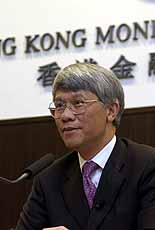
|
Investment return: Monetary Authority Chief Executive Joseph Yam says the Exchange Fund recorded an investment income of $89.6 billion in 2003. |
The Exchange Fund recorded an investment income of $89.6 billion in 2003, the Monetary Authority says.
After deducting interest and other expenses, net investment income was $83.4 billion. Of this, the Fiscal Reserves' share amounted to $25.7 billion which is more than double the $12.1 billion budgeted for in the 2003-04 financial year.
The balance of $57.7 billion has been added to the Exchange Fund's Accumulated Surplus for 2003.
The main components of this income were:
* total return from bonds and other investments of $18.7 billion;
* valuation gain on and dividends from the Hong Kong equities portfolio amounting to $21.2 billion;
* valuation gain on and dividends from other equities amounting to $26.8 billion; and,
* an exchange-valuation gain of $22.9 billion, mainly as a result of the appreciation of the euro against the US dollar.
Authority Chief Executive Joseph Yam said the investment environment last year had been particularly volatile and challenging.
The strong recovery in the second half of the year contrasted markedly with a difficult first half, in which world financial markets were clouded with uncertainties about the war in Iraq and the performance of major economies.
Equity holdings gains offset lower bond income
Income from bonds, though positive, was lower than in previous years, but this was more than offset by gains in equity holdings, Mr Yam said.
The further sharp appreciation of the euro also contributed to the Exchange Fund's investment performance.
In 2003 the total assets of the Exchange Fund rose $56.1 billion, from $955.1 billion at the end of December 2002 to $1.01 trillion at the end of December 2003.
The fund also achieved an investment return of 10.2%, 70 basis points above the investment return of the benchmark portfolio determined by the Financial Secretary after consultation with the Exchange Fund Advisory Committee.
Since 1999 the fund has achieved a compounded 6.3% annual return, or an annual out-performance of 170 basis points above the benchmark's compounded 4.6% annual return for the same period.
Since 1994 the Exchange Fund has generated a compounded annual return of 6.7%, compared with the compounded annual inflation rate of 1.3% over the same period.
2004 may not see same size gains as 2003
Mr Yam warned that the investment environment in 2004 is unlikely to be conducive to the kind of gains seen by the Exchange Fund in 2003.
"Returns on bonds will most likely continue to be limited, the prospects for equities are uncertain, and currency markets will probably continue to be volatile," he said.
The authority will exercise vigilance in this rapidly changing environment and will continue, under the guidance of the Exchange Fund Advisory Committee, to manage the Exchange Fund in a prudent manner, he said.
|